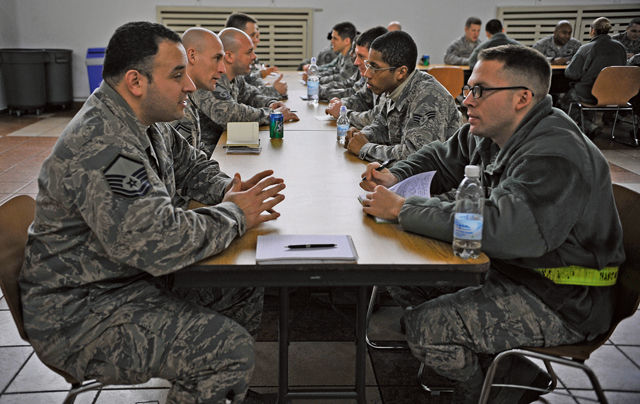
The Total Force Development Council hosted a speed mentoring opportunity for enlisted Airmen Feb. 4 at the Ramstein Northside Chapel Annex. This quarterly forum has been the biggest thus far at Ramstein, with a total of 41 mentors and mentees in attendance.
Twenty-one enlisted mentors spoke with junior Airmen about their experiences leading them to their current senior NCO rank. Though those being mentored were only given three minutes with each mentor, the purpose wasn’t to receive quick advice; it was to give the junior ranks the chance to form relationships with possible future mentors.
“The purpose is to connect an Airman with a mentor,” said Master Sgt. Etienne Tousignant, 86th Force Support Squadron career assistance adviser. “They have to get a feel for what’s out there. When the young Airmen hear the different answers from the senior NCOs, they find what works for them. In that type of forum, those Airmen and NCOs will have the opportunity to find the mentor that fits the niche they’re looking for.”
The mentees were asked to come up with two to three questions to ask the mentors. Discussions ranged from overcoming obstacles to personal life stories.
“I started looking online for good questions to ask, and I didn’t like them,” said Airman 1st Class Stacy Serries, 86th Medical Support Squadron out-patient records technician. “I decided to look for things I have issues with so I could get advice, because if I can’t improve those issues, I can’t excel.”
Serries said she looks for a mentor who is relatable, non-judgmental and caring.
As a mentee during the forum, Serries said she received the answers she was looking for as well as what she went there to find — a mentor.
“One of the mentors gave me her card so I can call her,” she said. “I feel like I have my own personal mentor now, and that’s really great.”
Having mentors can help Airmen grow as individuals, which benefits the Air Force. Mentors can guide them in a positive direction, answer questions and use their experience and knowledge to help in an abundance of situations.
Though it takes a good listener to make an effective mentor, Tousignant said it’s the ones who ask all the questions and lay out all the possibilities who have impacted him the most.
“I’ve had mentors who have listened to me and told me to keep going in the direction I’m going,” he said. “For me, my best mentors are the ones who told me the opposite. They’ve countered it and given me the perspective I needed to make the best decisions for my life. That’s the whole purpose of a mentor — to gain the perspective necessary to make those big decisions.”
Though Serries and Tousignant said the speed mentoring event was a positive opportunity for Airmen to receive the guidance they may have needed, that specific forum is not the only place to receive guidance.
“We gave it a name, location and time, but speed mentoring happens all the time,” Tousignant said. “People go to military events and meet new people; it’s the same thing, they’re just doing it on their own.”
The event was diverse in many aspects, such as rank, age, the units Airmen are with and many other variables. These differences allowed younger Airmen to hear a variety of experiences in a short amount of time with perhaps an even greater opportunity to receive more guidance in the future.


